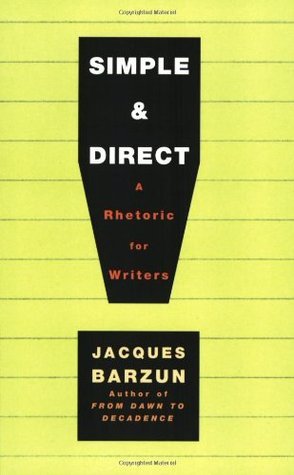What do you think?
Rate this book


After a lifetime of writing and editing prose, Jacques Barzun has set down his view of the best ways to improve one's style. His discussions of diction, syntax, tone, meaning, composition, and revision guide the reader through the technique of making the written word clear and agreeable to read. Exercises, model passages both literary and casual, and hundreds of amusing examples of usage gone wrong show how to choose the right path to self-expression in forceful and distinctive words.
288 pages, Paperback
First published January 1, 1975
A choice of terms may depend on an intuitive perception of nuances and visualizing of scenes: “She tucked her arm affectionately in his.” The tucking of an arm is best done by the party in whose elbow the other’s hand is placed; “slipped her arm in his” gives the truer sense of the scene. (150)Dude, seriously?